- Home
- John Bellairs
The Curse of the Blue Figurine
The Curse of the Blue Figurine Read online
THE CURSE OF THE BLUE FIGURINE
by John Bellairs
illustrations by Edward Gorey
digital preservation by Guy Montag
CHAPTER ONE
It was a cold winter evening in January. The year was 1951. A short, pale, bespectacled boy named Johnny Dixon was sitting in a big comfy easy chair in the parlor of his grandparents' house. Outside, it was snowing. Through the bay window you could see the flakes falling. The room was dark except for the faint yellow light that shone from the fan-shaped dial on the front of the big walnut Atwater Kent table-model radio that was next to the easy chair. Johnny's eyes were wide open. He was staring into the darkness and listening intently to the program. On his lap was a plate of Ritz crackers spread with pink pimiento-flavored cream cheese—Johnny always munched while he listened to the radio. This evening he was listening to one of his favorite programs, The House of Mystery. In this episode Sir Philip Stapleton, the renowned archeologist, had entered the forbidden temple of Kali in the jungles of India. With him was Inspector Marcus Quaterly of Scotland Yard, who had traveled all the way from London to help Professor Stapleton unravel the mystery of the savage killings that had plagued Delhi recently. The temple was dark. Each footstep that the two men took raised endless sinister echoes. Suddenly at the far end of the pillared hall something began to glow eerily. It was a huge golden statue of the four-armed goddess Kali. Now, as the two men stood frozen in their tracks, the statue began to move its arms slowly back and forth. And a hideous croaking voice chanted:
Yaa-maaa Yaa-maaa
Professor Stapleton's voice was an incredulous gasp. "What is it? What can it mean?"
Inspector Quaterly answered grimly, "Yama means death—it means death!" And then...
"Johnny! Johnny! Didn't you hear me? I've called you three times! Your grampa 'n' I are waitin', and your dinner's gettin' cold!"
Johnny looked up, startled. He really hadn't heard his grandmother calling. With a sad sigh he turned off the radio. He got up and brushed away some cracker crumbs. Then, meekly, with the plate in his hand, he followed his grandmother out to the dining room.
A few minutes later Johnny was sitting at the big mahogany dining room table with his grandfather and grandmother. As usual Grampa sat at the end by the window, in the chair with the arms. Grampa was a tall, slightly stooped old man who always wore gray work shirts and gray wash pants. He had a high, freckled forehead, and on his big sunburnt nose was perched a pair of gold-rimmed glasses. A few strands of white hair were strung carefully across the top of his head. Loose wrinkled flesh hung down in wattles from his cheeks, and his large hands were covered with brown freckles. Grampa was seventy-four years old. He was old, but he was cheerful—most of the time. He sang songs like "Oh, Susanna!" and "Peter Gray," and went on long walks all over the town with Johnny. He listened to baseball games with Johnny and helped him with his homework and played checkers and cribbage with him. Grampa was a good egg. He was almost like a father to Johnny, which was a good thing because (these days) he was just about the only father that Johnny had. And Gramma—for that matter—was the only mother he did have.
Up until about six months before, Johnny had lived in New York State, in the town of Riverhead on Long Island. But then his mother got sick and died of cancer. At first it seemed to Johnny as if the world had come to an end. Then, as the shock and grief wore off, he began to think that he was getting used to the idea of living alone with his dad. But the Korean War changed things. Johnny's father had been a bomber pilot during World War II. So the Air Force asked Mr. Dixon to come back and serve again, this time as a jet pilot. Mr. Dixon could have refused. He was the sole surviving parent of a child under the age of eighteen. But Mr. Dixon was itching to get into the cockpit of a fighter plane. And when he found out that Gramma and Grampa Dixon would be glad to take care of Johnny, his mind was made up. So Johnny went north, to the town of Duston Heights, Massachusetts, to live with his grandparents. It had been hard for Johnny to adjust to his new surroundings. He felt lonely a lot of the time, and he was also a little scared. But Gramma and Grampa had been as nice as they could be to him, and that helped a lot.
Johnny smiled happily as Gramma spooned mashed potatoes onto his plate. It was snowing outside, but it was warm and comfy in the big old house. A coal fire was roaring in the furnace in the basement, and the register in the floor breathed warm air into the room. The black Sessions clock on the sideboard ticked quietly and reassuringly. The dining room table was covered with a white linen cloth, and on it were good things to eat: roast beef, cabbage salad, mashed potatoes, and plenty of thick dark-brown gravy. And for dessert there would be either chocolate pudding or lemon meringue pie. The food that Gramma Dixon made tended to be the same, day after day, but it was always good.
As they ate, Gramma and Grampa talked quietly. Sometimes they talked about things that Johnny liked to talk about, but this evening they were chewing over some local gossip, about what so-and-so down the street was doing. Johnny thought all this was very dull, so he just munched and drank and went back to living in his own little dream world. He thought about how great it would be to be an archeologist. That was what he wanted to be, right now, more than anything in the world. He imagined himself with a pith helmet on his head and a pickax in his hand, wading through sand while the hot sun sizzled in the sky. Or exploring by moonlight, which was much more dramatic. Johnny saw himself wandering among the columned halls of the temple of Dendur or Karnak at night, when a pale, silvery sheen fell upon the mysterious hieroglyphs and the carved shapes of pharaohs and beast-headed gods. Was there danger here? Who could tell? What if a shape wrapped in tattered bandages stepped from the shadows and confronted him? What would Professor John Wellesley Dixon, Ph.D., do? Of course there was the large British Army service revolver in the holster that hung from his belt. But it would not be of much use against... The doorbell rang.
Once again Johnny was jolted out of his daydream. He glanced quickly toward the front hall. Gramma heaved a deep, discontented sigh. "Lord, I wonder who that is?" She hated to be interrupted during meals.
"I'll go see," said Grampa. He shoved his chair back and got up.
"Me too," said Johnny. He got up and followed his grandfather out to the front door. He really had no reason to go along, but he went anyway, out of sheer uncontrollable curiosity.
Grampa pulled at the front door, and it opened with a rattle. There on the snowy porch stood Professor Childermass. Professor Roderick Childermass, Ph.D., to be precise. Professor Childermass was a short, elderly, red-faced man. A wild nest of white hair covered the top of his head, and mutton-chop whiskers sprouted from the sides of his face. His nose was red and pitted and reminded Johnny of a strawberry. Perched slightly askew on the professor's head was an old shapeless gray fedora, and thrown over his shoulders—sort of like a cape—was an unbelievably dirty and threadbare tweed overcoat. In his left hand the professor clutched a shovel—or what had once been a shovel. It had been one of those little collapsible shovels that the Army calls "an entrenching tool." But the red-colored blade had been battered into a shapeless mass of metal, and the hinged wooden handle was splintered and almost broken in two.
"I am so angry that I can't see straight!" the professor announced through clenched teeth. "I'm so angry that I'd like to murr-der someone!"
Grampa couldn't help grinning. He and the professor were old friends. They had had many heated arguments about politics and life and things in general and had always managed to stay friends. Grampa knew that the professor was basically a very kindly man, although he had a rotten temper. Johnny did not know the professor quite as well. He had seen him a few times on the street, and he was
—to tell the truth—a bit scared of him. But when he saw his Grampa smiling in such a friendly way, he figured the professor must be an okay person.
"So you wanta murder somebody?" said Grampa, still grinning. "Are you gonna start with the two of us and then work your way down the block? From the way things look," he added, pointing to the shovel, "you've already got started. Who was it? Mrs. Kovacs? Or didja get a cop?"
"Oh, shut up," muttered the professor. He scowled at the broken shovel. "Just you shut up. I destroyed this thing by beating it against the fire hydrant outside my house. I am mad because my car is stuck in the snow and I can't get it out. I've tried everything. I've dug, I've rocked the car, I've... oh, drat! Just drat! Can I come in and get warm?"
"Sure," said Grampa, chuckling. "Anything to keep you from standin' there in the doorway and lettin' the cold air in. Come on out to the dinin' room and I'll getcha a cuppa coffee. Then, when you're all thawed out, we'll go get your dad-blasted car outa the dad-blasted snowbank. Okay?"
"Thanks," said the professor stiffly. He stalked through the hall and into the house without taking off his hat, his coat, or his galoshes. As he went he left big gobs of melting snow behind him. Uh oh, thought Johnny, Gramma is gonna have a fit. Gramma was one of those fussy types who vacuum the house twice a day. She was always dusting and picking up and emptying waste-baskets and ashtrays. Johnny watched with amusement and horror as Professor Childermass stomped to the dining room table and sat down.
"Evening, ma'am," he said, nodding curtly to Gramma. "Just go on with your dinner. Don't mind me." He leaned forward, put his elbows on the table, stared off into space, and began to hum tunelessly. Humming was what he always did when he was trying to cheer himself up after losing his temper.
"Professor Childermass," Gramma said in a biting tone, "do you think you could manage to go out to the front hall and take off your galoshes?"
The professor looked startled, and then he looked sheepish. He glanced hurriedly at his feet and got up. "Excuse me, madam," he said hastily, and he tramped back out to the front hall, leaving a pool of water at every step. Gramma went to the cupboard and got out a small plate. She cut a piece of pie for the professor, and then she went to get a mop. When the professor came back, he apologized for tracking up the floor, and Gramma said, "Ummm," which was her way of accepting an apology. Then everybody ate lemon meringue pie and listened to the professor as he complained about his car and life in general.
Later Grampa and Johnny got their coats and boots and hats on and went out to help the professor get his car unstuck. It was still snowing on Fillmore Street. Flakes came whirling down out of the dark sky. They looked black as they swept through the light of the streetlamp. Across the street was the professor's car. Its rear end was buried in a heap of snow. The situation looked hopeless, but Grampa reassured everybody. He said that he had once driven a Model T on muddy dirt roads in the springtime. And, said Grampa, if he could do that, he could get a car out of a miserable little bitty snowbank.
They set to work. The professor got into the car and started it. Grampa told him to rock it, and he and Johnny would push. The car rocked, and the wheels spun and whined. Spurts of snow flew up into the air. The professor had his car window open so he could give and get directions. Johnny could hear him cursing under his breath as the car lurched back and forth. At first nothing happened. The car just seemed to be digging itself deeper and deeper into a snowy rut. "Cramp the wheel over!" Grampa called. "Cramp it way over!" The professor cramped it over, and suddenly, with a jolt, the car shot forward, spraying wet snow all over Johnny and Grampa. The professor—who was not a very good driver, even under the best of conditions—pulled the car out into the middle of the street and did a U-turn, fish-tailing madly. The engine died, and he started it again. Finally he managed to nose the car over to the curb in front of Grampa's house. It was not a very good parking job. The rear end of the car was sticking out into the street. But the professor didn't care: he was disgusted and tired. He got out of the car, slammed the door, and stood there with his hands on his hips, glowering.
"Cars!" he snorted. "I hate them! Hate them, hate them, hate them! If I didn't have to have one to drive to work, I'd push this thing into the Merrimack River! So help me, I would!"
Grampa ambled slowly across the street, brushing snow off himself. "You know, Rod," he said slowly, "it would kinda help if you would put chains on your tires."
The professor looked startled, and then he waved his hand in an irritated way. "Oh, chains! Yes... hmm, yes, I suppose I should have thought of them! But I have so many things on my mind these days... hmmm... chains... yes. By the way, Henry, don't call me Rod. I hate to be called Rod. You know that."
"Sorry," said Grampa, shrugging apologetically. "I keep forgettin'."
"Think nothing of it," said the professor brusquely. "Can I come into your house and get something strong to drink? Some booze, I mean. It would make me feel better."
Johnny gasped. He had always had it drummed into his head when he was little that you never, never invited yourself into other people's houses. It was terribly impolite. But here was the professor—a college teacher and a respected member of the community—doing just that. And to top it all off, he was asking for liquor! Asking for it first, instead of waiting to be served. And Grampa didn't seem to mind at all. It seemed unfair, somehow.
Laughing and talking, the professor and Grampa stomped through the snow and up the stairs to the porch. Johnny trailed along behind. When they got to the front door, they found Gramma blocking the doorway. She had a mop in her hand, and she looked grimly determined. She was not going to let the professor track up her rugs and floors a second time. He took the hint. Meekly, with downcast eyes, he shuffled over to the coat-tree, sat down on the boot box, and began peeling off his galoshes.
A few minutes later Johnny, Grampa, and the professor were all sitting around in the parlor, talking. Johnny had gotten a Coke from the refrigerator, and Grampa was drinking coffee. The professor had a water glass half full of whiskey in his hand. Gramma disapproved of liquor, so she was not present. She was upstairs in her bedroom, listening to the radio after saying her rosary.
"So, y'see, it wasn't such a big job after all," said Grampa amiably as he sipped from the steaming mug. "It only took us, oh, I'd say about twenty minutes, at the outside."
"Is that all?" grumbled the professor. He was trying hard to be grumpy, in spite of the cheerful company. "It seemed like hours. You know," he went on, wagging his finger at Grampa, "you know, Henry, in a hundred years people will think we were out of our ever-loving minds to spend so much of our valuable time taking care of automobiles. Think of it! Everybody on this block owns a two-ton hunk of metal that he has to feed gas and oil into, wash, and get fixed when it goes flooey. We spend half our lives thinking about cars! It's ridiculous, I tell you! Ree-dick-u-lous! Why..."
Suddenly the professor stopped talking. He had noticed something. On the floor next to the armchair that Johnny was sitting in was a pile of books. They were books on archeology that Johnny had taken out of the library recently: there were Gods, Graves, and Scholars, by C. W. Ceram, and The Mountains of Pharaoh, by Leonard Cottrell, and James Henry Breasted's History of Egypt. Egypt was Johnny's latest craze: he read everything he could about Egypt, and he was always combing the library for Egypt books that he hadn't read.
The professor looked at Johnny questioningly. "Are... are those books yours?" he asked. He said this as if he could scarcely believe that the answer might be yes.
Johnny did not see what was so unusual about reading books on Egypt. He was always reading books about something. "Yeah, they're mine," he said casually. "I mean... well, they're not really mine, they belong to the library. But I took 'em out to read, if that's what you mean."
"You took them out to read," the professor repeated in a wondering tone. "Do you have an assignment in school about Egypt? Is somebody making you read those books?"
Johnny grinned and sh
ook his head. "Nope. I like to read."
The professor was astounded. He acted as if Johnny had just told him that he was the pope, or the sultan of Zanzibar. "Good heavens!" he exclaimed. "You can read, and you like to read! Please excuse my amazement, but I have just come from visiting my sister's daughter, who lives up in New Hampshire. She has two children about your age, but they couldn't read their way through a book of cigarette papers. Which is scarcely odd, because their parents don't read anything except the phone book and the directions on spaghetti boxes. You like to read! Lord have mercy! Will wonders never cease!"
Johnny found that he was beginning to like the professor. He smiled happily and felt proud. Usually grownups were not in the least interested in Johnny's reading ability. If they noticed it at all, they said, "Oh, that's nice," in a polite sort of way. But what they really thought—as Johnny well knew—was that boys who liked reading as much as he did must be weird.
Johnny asked the professor some questions about mummies, and the professor answered them as well as he could. From mummies the conversation turned to ghosts, and the professor told about the haunting of the Borley Rectory in England and other spooky happenings that he had heard about. Johnny loved ghost stories. That was one of the reasons he listened to The House of Mystery and The Hermit's Cave. But, as he told the professor, he didn't actually believe in ghosts, not really. As far as Johnny was concerned, believing in ghosts was... well, it was like believing in Santa Claus, or the Easter Bunny. It was for little kids, not for him.
"Oh, is that so?" said the professor, eyeing Johnny curiously. A faint half-smile curled the corners of his mouth. "Is that really so? It's kid stuff, is it? Well, my friend, you might be surprised someday. Do you know about the ghost of Father Baart that haunts the church you go to every Sunday? Do you? Hmmm?"
Johnny was really taken aback. He went to St. Michael's Catholic Church all the time, with his grandmother and grandfather. But he had never heard about any ghost.

 The Curse of the Blue Figurine
The Curse of the Blue Figurine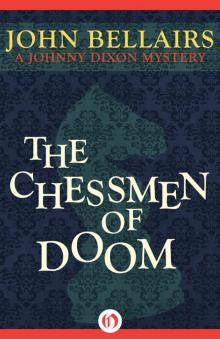 Chessmen of Doom
Chessmen of Doom Secret of the Underground Room
Secret of the Underground Room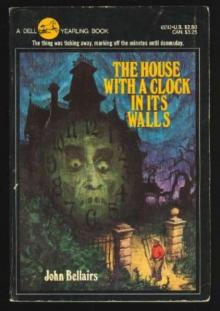 The House With a Clock in Its Walls
The House With a Clock in Its Walls The Vengeance of the Witch-Finder
The Vengeance of the Witch-Finder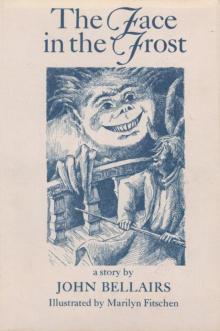 The Face in the Frost
The Face in the Frost Revenge of the Wizard's Ghost
Revenge of the Wizard's Ghost Spell of the Sorcerer's Skull
Spell of the Sorcerer's Skull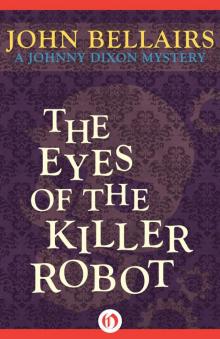 Eyes of the Killer Robot
Eyes of the Killer Robot Mummy, the Will, and the Crypt
Mummy, the Will, and the Crypt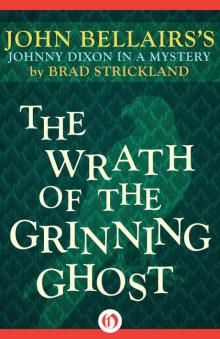 Wrath of the Grinning Ghost
Wrath of the Grinning Ghost The Mansion in the Mist
The Mansion in the Mist The Doom of the Haunted Opera
The Doom of the Haunted Opera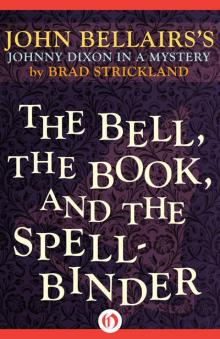 The Bell, the Book, and the Spellbinder
The Bell, the Book, and the Spellbinder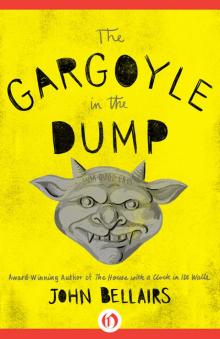 The Gargoyle in the Dump
The Gargoyle in the Dump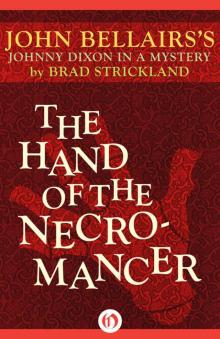 The Hand of the Necromancer
The Hand of the Necromancer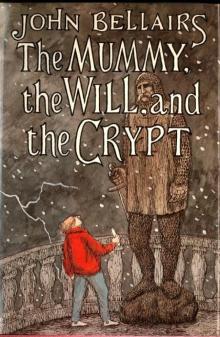 The Mummy, the Will, and the Crypt
The Mummy, the Will, and the Crypt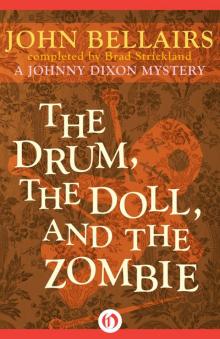 Drum, the Doll, and the Zombie
Drum, the Doll, and the Zombie The Specter from the Magician's Museum
The Specter from the Magician's Museum The Letter, the Witch, and the Ring
The Letter, the Witch, and the Ring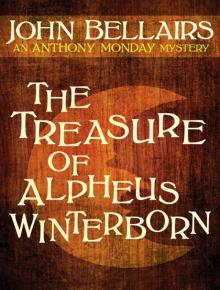 The Treasure of Alpheus Winterborn
The Treasure of Alpheus Winterborn The Dark Secret of Weatherend
The Dark Secret of Weatherend The Figure in the Shadows
The Figure in the Shadows